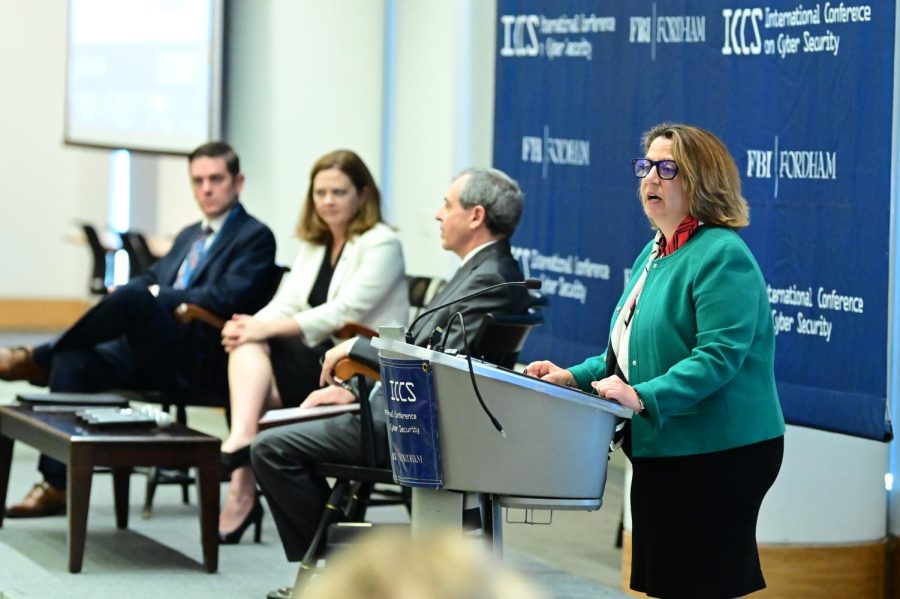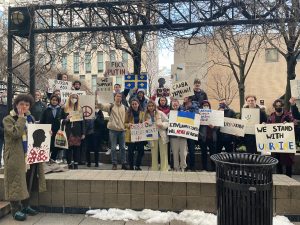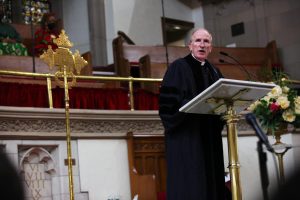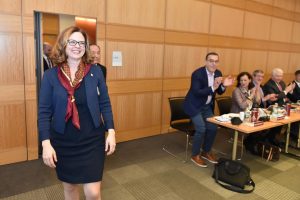ICCS Held In Person for First Time Since 2019
The ninth conference invited the U.S. attorney general, Google executives and government officials to speak on the threat of cyberattacks
COURTESY OF CHRIS TAGGART
U.S. Deputy Attorney General Lisa O. Monaco delivered the keynote address on the conference’s opening day
August 27, 2022
Fordham University, in collaboration with the FBI, hosted its annual International Conference on Cyber Security (ICCS) on July 18-20. The convention was created by Anthony Ferrante, Graduate School of Arts and Sciences ’04, and his mentor, Clavius Distinguished Professor Frank Hsu of the Department of Computer and Information Sciences, in 2009 after Ferrante joined the FBI and worked on a case that involved a terrorist cell using advanced technologies to plan an attack against the U.S.
In the past, the conference has attracted numerous speakers from the government, private sector and academia and has brought together directors from across the FBI, CIA and National Security Agency. ICCS has also invited the director of national intelligence, according to the conference’s website. ICCS takes place every 18 months and is a two-day convention where global leaders in cyber threat analysis, operations, research and law enforcement engage in discussion and share their experience facing cyber threats.
This year was the ninth conference and was the first convention to be held in person since the start of the COVID-19 pandemic. The conference was hosted at Fordham’s Lincoln Center campus in the Law School building.
Registration for the conference was limited to 200 attendees and tickets were sold at $895. Additional programs, such as the Cyber Security Tutorial and Law Enforcement Workshop, cost an additional $75 per session. The conference sold out and was packed with panels featuring Google executives, government officials and more.
The FBI’s New York Cyber Branch Acting Assistant Special Agent-in-Charge Amit Kachhia-Patel oversaw the conference and helped organize the event. When asked about the planning, he revealed that this year’s ICCS was only planned four months in advance, whereas, in the past, the conference had been planned with a year’s notice. He also spoke about the notoriety the conference has gained over the years, which explained how ICCS was able to garner several experts and executive guests and speakers in attendance.
The program kicked off with a keynote address delivered by the U.S. Deputy Attorney General Lisa O. Monaco. Monaco was previously invited to speak at the conference in 2016 while she was serving as the chief counterterrorism adviser under former U.S. President Barack Obama’s administration.
“I would love to see a focus on private industry and what they are doing in the cybersecurity space at the next conference along with all the great government speakers that we get out there as well as the international law enforcement.” Amit Kachhia-Patel, the FBI’s New York Cyber Branch Acting Assistant Special Agent-in-Charge
Following Monaco’s address, Kent Walker, president of global affairs at Google, presented his keynote speech about the importance of transparency in cyberattacks. He described his experience handling a series of cyberattacks called Operation Aurora Google in 2009; Google was one of the few companies that decided to publicize the attack. He urged the cybersecurity community, law enforcement and the public to be more transparent about their struggles with cybersecurity threats to improve security worldwide.
The panel discussions that followed were based on current cybersecurity threats that were relevant on a global scale and discussed how best to respond when faced with them, according to Kachhia-Patel. He voiced that the selection of panel topics was based on current cybersecurity threats that were relevant on a global scale.
“We talked a lot about, in a theoretical context, what it would be like if there were an actual cyberwar, and now we are actually seeing that with Ukraine,” Kachhia-Patel said. “So, we were very fortunate to have the (Ukrainian officials) who happen to be making a trip to the United States, and our conference coincided with their trip.”
Some of these panels allowed attendees to receive one continuing professional education (CPE) credit in the information technology field and up to 10 CPE credits at the conference.
According to Kachhia-Patel, the highlight of the conference was a panel titled “Under Cyber Siege: How Ukraine is handling its virtual front line” that took place on the conference’s last day. The panel was composed of four Ukrainian officials supervising cybersecurity during the ongoing Russia-Ukraine crisis. The officials discussed their defense against security threats and how collaboration and communication within the global cybersecurity ecosystem will create the solid cyber alliance needed to face such threats.
Although numerous government officials were speaking at the event, Kachhia-Patel hopes there will be more participation from the private sector in the future.
“I would love to see a focus on private industry and what they are doing in the cybersecurity space at the next conference along with all the great government speakers that we get out there as well as the international law enforcement.”
















